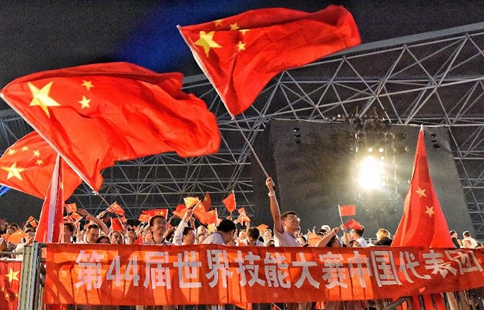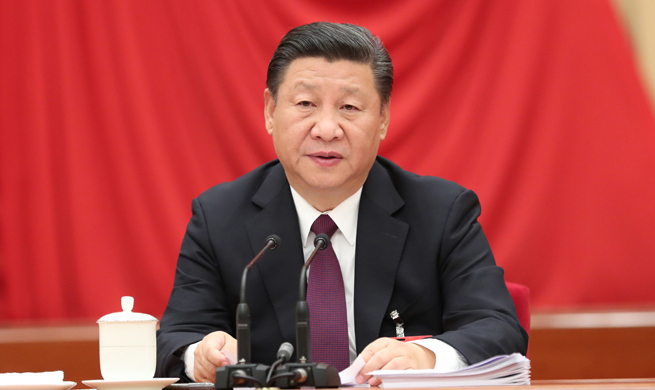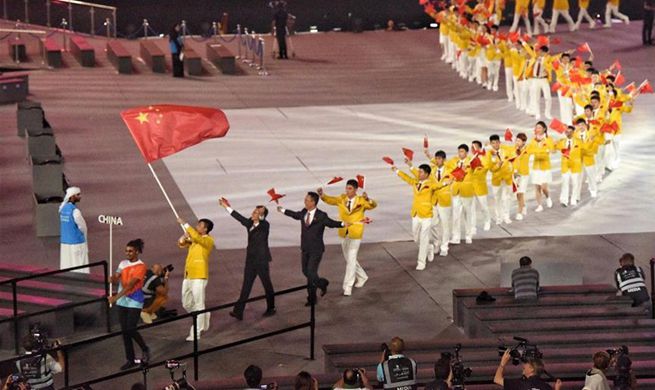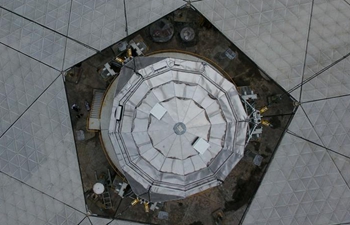by Keren Setton
JERUSALEM, Oct. 15 (Xinhua) -- Israeli Prime Minister Benjamin Netanyahu welcomed U.S. President Trump's announcement on Iran, as experts thinks tensions could spiral with such a statement.
Trump stopped short of pulling out of the JCPOA (Joint Comprehensive Plan of Action) dealing with the Iranian nuclear program that was reached after lengthy negotiations two years ago.
The Israeli leader has been a fierce critic of the deal but has failed to rally international support for his stance.
During his presidential campaign, Trump repeatedly slammed the deal, saying he would cancel it.
Netanyahu had finally found an ally -- and one that had serious clout in the international arena.
So over the weekend, when Trump said he would not re-certify the deal with Iran, as U.S. law mandates -- Netanyahu's office immediately released a pre-recorded message in which the Israeli PM congratulated Trump for his "courageous decision."
While Trump could have withdrawn the United States from the deal completely, he did not. It is now in the hands of the U.S. Congress -- will they find away to appease Trump or will the U.S. leave the deal?
Should the U.S. Congress re-introduce sanctions on Iran, the United States will be considered in violation of the JCPOA, giving the Iranians possible justification to abandon the agreement.
This could set the stage for rocky times.
"There is now potential for unstable conditions in the region, a greater potential for a confrontation than in the past," said Ehud Eiran, a Board Member at Mitvim, the Israeli Institute for Regional Foreign Policies, and an assistant professor of international relations at the University of Haifa. He is also a former assistant foreign policy adviser to Israel's prime minister.
Earlier, Israeli Intelligence Minister Yisrael Katz said to Israel's Channel 2 news that he thought the statement had the potential of starting a war.
"The statement was based on the current agreement but was very clear about the future," said Katz minutes after Trump finished his speech.
Eiran pointed out that the Iranian presence in Syria, on Israel's northern border, is now more sensitive than ever. Iran also backs Hezbollah in Lebanon -- a guerrilla organization which has frequently clashed with Israel. Friction points are hence increasing.
"Iran sees Israel as an American proxy," Eiran said, adding that the move by Trump also damages the stability of the international coalition against Iran.
All these conditions do not bode well for stability in the region.
The United States is not the only party to the deal. There are seven other signatories which are still very much in favor of the original deal. Netanyahu and Trump are in a minority.
A few weeks ago, when the Israeli prime minister made yet another threat towards Iran while speaking at the UN General Assembly, Israeli and international media reported that Netanyahu does not have the support of defense officials within his administration.
"The Israeli voice is not unified," Eiran said.
Israeli military and security officers have been quoted as saying the deal has its benefits, mainly keeping Iran under close tabs. So far no one has come up with a better alternative to the international pact.
So how can Netanyahu see the Trump move as an achievement?
Amir Oren, a columnist from Israel's Haaretz newspaper, wrote that Trump's speech "burst Netanyahu's last hope ... to create a ... crisis with Iran." But clearly, the reactions in the international arena demonstrate that there is fear of a crisis, be it military or diplomatic.
Eiran said Netanyahu can be satisfied for several reasons.
"Firstly, it allows him to portray himself as the first leader who warned of the danger," he said. "It is very convenient internally, as it allows him to divert attention from investigations against him, from media coverage of him."
Netanyahu is the subject of various police investigations dealing with suspected corruption. Media coverage of his affairs has caused him public discomfort.
But the Trump speech did have an achievement for Israeli policy. The Jewish state, which sees Iran as its arch enemy, has frequently warned that Iran has other programs that are just as dangerous as its nuclear one.
Trump basically adopted the Netanyahu stance and marked Iran as the chief destabilizer of the region.
The JCPOA does not deal with Iran's ballistic missile program which it is developing enthusiastically.
In fact, days after Netanyahu's UN speech, Iran tested a long range ballistic missile in a clear provocation.
"Israel's main goal is to roll-back Iranian influence in the region, the nuclear program is just one component of that," Eiran added.
Whether Netanyahu will sit on the sidelines in the next 60 days or try to influence the U.S. Congress as he has done in the past is not known.
This could be an opportunity for him to get the United States to tweak the agreement in a manner that will be more favorable to Israel. He himself suggested in the UN that the agreement could be fixed.
"In the end, Netanyahu, with all his rhetoric, is very, very careful ... he wants to see Iran contained, but he will be very careful to take aggressive steps," Eiran said.

















